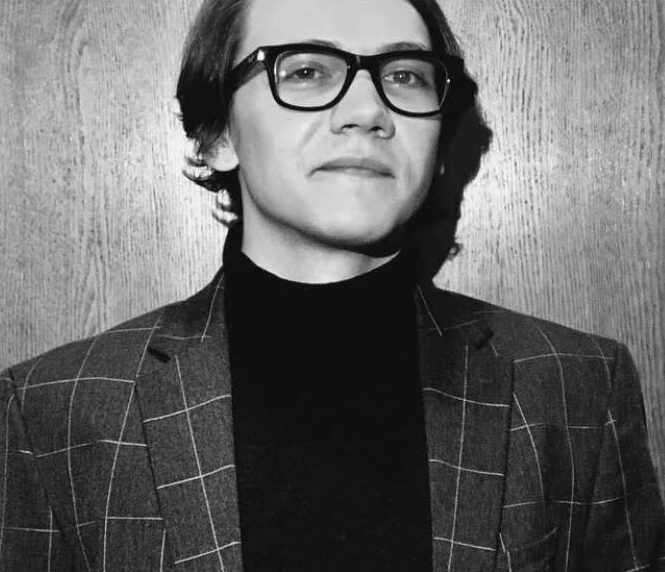Vincent Kancans

Contact
E-Mail: kanca005@umn.edu
Title of the Dissertation
Unraveling the Nostalgia for Magnetic Tape
Project Description
This dissertation project begins as a media history of magnetic tape from its invention to its global circulation and eventual decline in the late 20th century, followed by the recent tape revival. Between the phonograph and the MP3, relatively little work has been done on tape. I read various literary texts and media devices across the lifespan of tape. This historical analysis leads me to a media philosophy of ‘world disclosure,’ namely the idea that the individual’s embodied engagement with the medium is an utterly unique way of apprehending the world, and that this activity multiplied across many subjects entering into dialogue with each other subsequently conditions a unique social world mediated by tape. I refer to underground tape exchanges and subcultures. I argue that the perceived loss of individual and social worlds linkedto tape due to the progress narrative of neoliberal capitalism leads to nostalgia, which may be a trap used to sell memorabilia or a radical rejection of obsolescence.
I’m interested in the persistence of obsolete media in the public imagination. The media archaeologist Jussi Parikka has coined the term ‘zombie’ media for technical objects that have a life beyond their purported demise. The impetus for revivalism is in question: scholars in nostalgia studies have distinguished between the nostalgic mode, a criticized strategy of consumption that recycles the commodities of an imagined past, and the nostalgic mood, a longing that reveals affective connotations in the nostalgia object. Rather than being a mere novelty that allows the market to recycle its own media detritus, tape in literature and popular culture has a longstanding connection to haunting, mourning, loss, and recollection. It isnecessary to examine tape in its social dimension to see which critiques of the nostalgic mode are valid, but also in its individual dimension to see the causes and effects of the nostalgic mood in tape users. Hence, I use the word “unraveling” in my title to suggest that nostalgia should be investigated and yet destabilized.
I first describe the evolving materiality of tape throughout the 20th century. I then look at its rolein individuation and self-reflection as seen in literature, especially in Ulrich Plenzdorf’s East German reimagination of Goethe’s Werther. Plenzdorf prefigures the tape phenomenon of the 1970s-80s. His work identifies a contradiction between the individual and a society shaped by the dictates of an authoritarian state. Additionally, the medium of tape conditions the literary form, which in turn points to the allure of tape as a vehicle for self-exploration. I then move to the ‘heyday’ of tape and describe how the medium reconstituted the social sphere with reference to Shuhei Hosokawa’s “The Walkman Effect.” Our notions of being-with have been shaped by magnetic tape. Rather than leading to an epidemic of the ‘lonely crowd,’ tape revealed new forms of collectivity and material culture. I delve deeper into Hosokawa’s references to Jean-Francois Lyotard and his dispute with Jurgen Habermas on possibilities of rationally grounded discourse, which I argue are strongly shaped by media technologies. Having looked at historical tape representations and phenomena, I turn to the contemporary tape revival. I dig beneath the surface of the audiovisual appeal of the ‘tape aesthetic’ to identify connections to a utopian ‘past future’ latent in the forgotten medium that was never fulfilled. I speculate that the nostalgic mood may be a palliative for the violence inflicted by the above-mentioned progress narrative. This economic and social milieu discards human beings as quickly as it discards obsolete media, leading people to see fragments of their subjectivity mirrored in forgotten media formats like tape. Still, tape might become part of future media ecologies, or a different medium mightreenact the revolutionary power of tape.
Scholarly Career
2023-2024 (Wintersemester): Assoziiertes Mitglied am DFG-Graduiertenkolleg „Das Dokumentarische. Exzess und Entzug“, Ruhr-Universität Bochum
Seit 2020: Doktoratsstudium der Germanistik und Medienwissenschaft (Moving Image Studies), Universität Minnesota
2018-2020: Masterstudium der Germanistik, Universität Minnesota
2012-2015: Bachelorstudium der Germanistik und Linguistik, summa cum laude, Phi Beta Kappa, Universität Minnesota
Publications
- Kancans, Vincent. „Accumulation and Race in the Neoliberal Epoch”. Journal of American Socialist Studies, vol. 2, 2022.
- Übersetzung gemeinsam mit Prof. Ross Etherton (bevorstehende Veröffentlichung): Maye, Harun. „What is a Cultural Technique?”
Talks
- 2023: „Ulrich Plenzdorf’s New Werther: Narrative Forms and Possibilities of Resistance in Technical Media”, Vortrag im Rahmen der German Studies Association Conference, Montreal, Canada
- 2023: „German Public Television and Cultural Identity: The Legacy of the Public Service Remit”, Vortrag im Rahmen der GGSA Conference, Ohio State University
- 2022: „Software emulations of ‘outdated’ console hardware”, Einzelprojekt im Rahmen des Seminars „Model Realities: On Simulationstechniken“, German Studies Association Conference, Houston, TX
- 2022: „Reading Kazakh New Wave Cinema Through (German) Media Theory”, Vortrag im Rahmen der ELTS Permanence and Decay Conference, UC-Los Angeles
- 2021: „Shadows of the Autobahn in the American Ghetto“, Vortrag im Rahmen derInterdisciplinary German Studies Conference, UC-Berkeley
- 2019: „Radio-Aktivität and the Technological Potentialities of the Cold War”, Vortrag im Rahmen der GDGSA Sound Studies Conference, UW-Madison
University Courses
- Wintersemester 2023-24, „Ludology and Ludomusicology“ (von mir entworfen), Ruhr-Universität Bochum
- Sommersemester 2023, GER 1004, Intermediate German II (Schnellkurs), Universität Minnesota
- Frühlingssemester 2023, GER 3011W, Conversation and Composition, Universität Minnesota
- Herbstsemester 2022, GER 3104W, Reading and Analysis of German Literature, Titel: „Coming of Age, Media, Youth Culture“ (von mir entworfen), Universität Minnesota
- Frühlingssemester 2022, GER 1004, Intermediate German II, Universität Minnesota
- Herbstsemester 2021, GER 1003, Intermediate German I, Universität Minnesota
- Frühlingssemester 2020, GER 1002, Introductory German II, Universität Minnesota
- Herbstsemester 2019, GER 1001, Introductory German I, Universität Minnesota
Organization
Frühling 2022, Organisation der Konferenz „Spectral Spaces“ (Modern Languages and Literatures Graduate Conference II), gemeinsam mit anderen Doktorand*innen, Keynote-Speaker: Prof. Philippe Lynes (Durham)
Frühling 2021, Organisation der Konferenz „Remapping Communities“ (Modern Languages and Literatures Graduate Conference I), gemeinsam mit anderen Doktorand*innen, Keynote-Speaker: Prof. Didem Uca (Emory)
